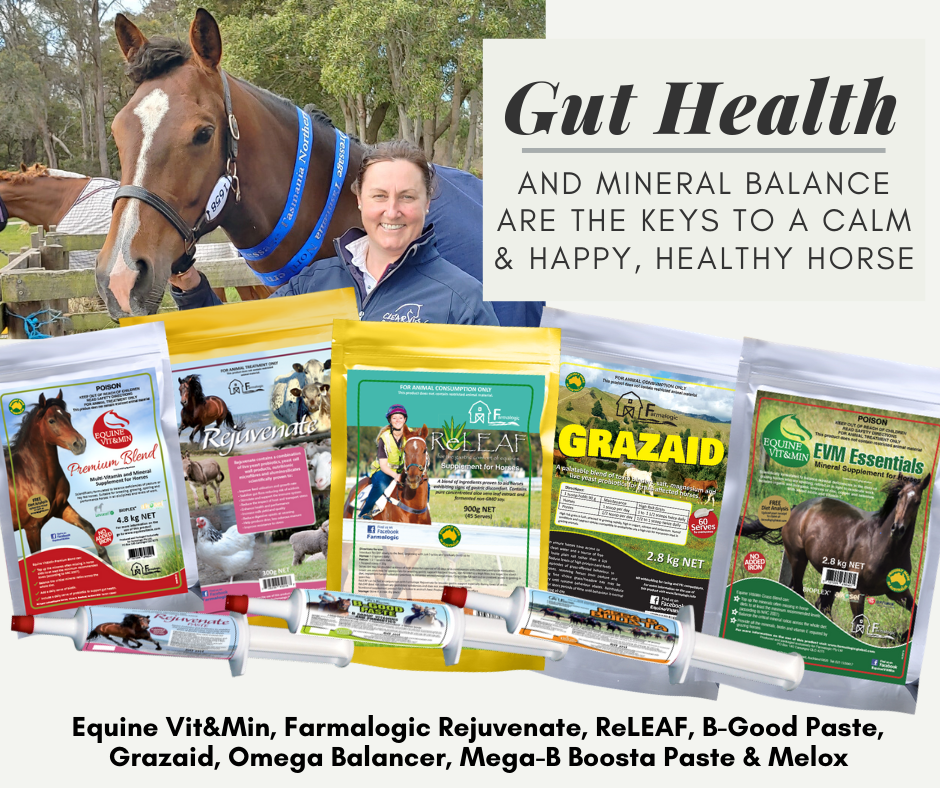Understanding the links between behaviour, calming supplements and the gut
Many horse owners reach for calming pastes before traveling or competition in the hope of avoiding a stressful journey and an over-excited and difficult-to-handle horse on arrival. Whilst some of these products do work, there is little or no evidence to support using some ingredients commonly found in horse calmers.
Tryptophan
Whilst tryptophan calmers have demonstrated calming effects in some species, to date equine research has not provided evidence that commercial tryptophan supplements have a calming effect in horses. In fact, some equine studies show that low doses of tryptophan may cause excitability. Very high doses of supplementation (over 300mg/kg) caused respiratory distress and a reduction in exercise endurance.
High dose Magnesium & Vitamin B
There is also a lack of scientific trials to examine the effectiveness of high levels of magnesium and B-group vitamins for calming horses. Many of these products are included in traditional ‘calmers’ because a deficiency in these ingredients can cause clinical nervous system symptoms.
Research has linked magnesium depletion in horses to brain malfunction but no scientific evidence exists to support the use of excess magnesium to improve brain function or reduce excitability.
B-group vitamins are important for energy metabolism and nervous system function. Signs of deficiency include decreased appetite and increased irritability. The gut microbial population is responsible for production of much of the vitamin B that horses require.
Providing nutrients to overcome nutrient deficiency or imbalance can impact positively on behaviour but scientific data does not exist to suggest that feeding at high levels has a calmative effect.
Herbs
Some herbs do contain behavior modifying chemicals and should be considered a medicine rather than a nutritional supplement. Valerian, chamomile, hops and peppermint are used as calmers for horses. Care must be taken to ensure these are sourced from qualified herbalists able to provide advice on dose requirements and precautions for specific animals. Owners using herbal supplements must also be aware of current banned substances in their rules of competition.
Probiotics and the Gut-Brain Axis
Exciting new research is emerging to demonstrate the significant influence of the gut microbial population on animal health and behavior. Disruption of the balance of gut microbial species (as occurs during stress) has been demonstrated to cause behavioral change in some species.
Animals treated with probiotics have measurably lower levels of corticosterone, a stress hormone. Scientists believe that supplementation with probiotics to improve digestive comfort is a plausible strategy that could contribute to behavior modification in horses. Supplementation with live yeast Saccharomyces cerevisiae or specific Lactobacillus bacterial species maintains the natural diversity of hindgut bacterial populations. This reduces the levels of lactic acid and maintains a more stable hindgut pH which could reduce the impact of stress on the gut and avoid deficiencies in the vitamins and amino acids normally provided by a healthy hindgut microbiome.
Omega-3 Fatty acids
Scientists researching dietary polyunsaturated fatty acids have found that omega-3s in the form of DHA and its precursor, EPA, can improve cognitive function in humans. Research from many species demonstrates that DHA is essential for normal brain development before and after birth. New work is linking EPA to mood and behavior. Perhaps in future we will see research linking marine-sourced omega-3 supplementation (DHA and EPA) to improved horse behavior and learning!





Do you claim that this product will stop a horse being buddy sour? Will it calm the horse so she won’t want to keep getting back to the other horse ? Beca7se at this moment all she is good for is dog meat?
Hi Robert, we can’t guarantee that Rejuvenate will stop every horse from experiencing separation anxiety, but we do have evidence that supporting gut microbes during stress events helps keeps horses eating and reduces the levels of stress hormones in the blood. This frequently flows on to horses being more relaxed during situations that have been problematic in the past. Customers frequently report that Rejuvenate has helped horses with separation anxiety to stay calm and continue eating when left behind.